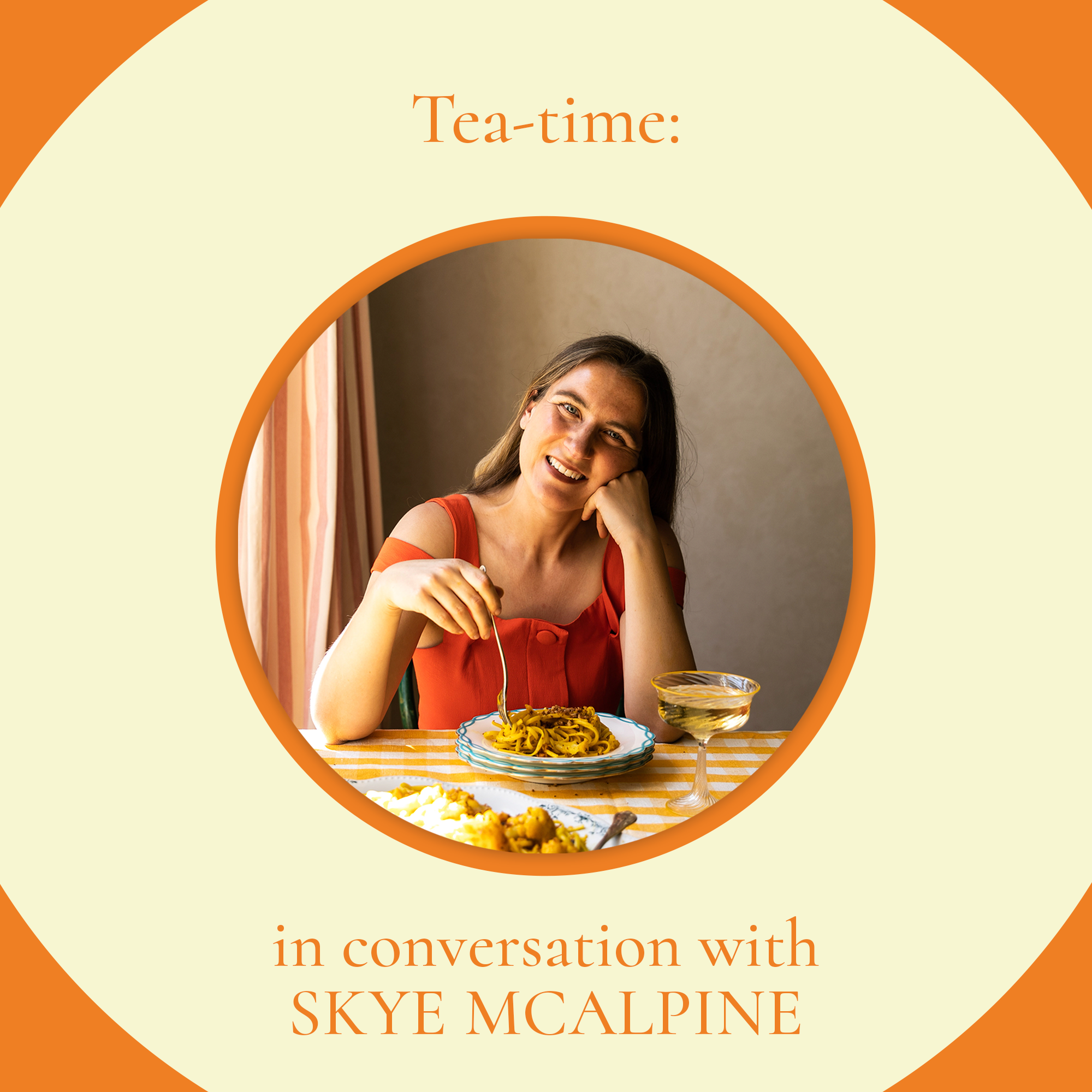
Tea-time: In Conversation with Skye McAlpine
by Clemmie Read | October 19, 2022
“A good cook is like a sorceress who dispenses happiness.” Elsa Schiaparelli’s words are certainly true of Skye McAlpine, the Venice-based cookery writer behind the hit blog From My Dining Table (and graduate of University College, Oxford). In A Table in Venice and A Table for Friends – and her upcoming A Table Full of Love – McAlpine guides us through la dolce vita and food as the greatest love language of all. Clemmie Read interviews McAlpine for The Isis about cooking for friends and how we too can savour la dolce vita.
C – The Isis’s theme this term is about sitting down and savouring the small things in life, particularly food. How did you get into cooking, specifically as a student? What was your general approach?
S – I’ve always been a very greedy person. I grew up in Italy, and it’s impossible to grow up in Italy and not love food. And more than food, I love the mealtimes and the rituals that surround it, and the people that are brought together through food. But I first started to cook for myself when I was at university. I always had a toaster in my room and would host afternoon teas with crumpets, but in third year when we moved out and I actually had a kitchen I started cooking and having friends over for dinner. I really didn’t know what I was doing at all, so I bought lots of cookbooks. That’s when I got into cookbooks as something to savour in themselves – I still have a huge stack by my bed [points to the wall behind her, one long bookshelf with an array of colour-coded cookbooks]. I love cookbooks, and if I’m feeling tired or I’ve had a long day, my big treat will just be leafing through the pages. They’re like picture books.
C – Where do your recipes come from? Do you put a spin on other recipes, or learn from people you know? And are they something which brings you closer to other people?
S – Definitely, with the recipes in my books. My first book A Table in Venice was really a celebration of Venetian home cooking, so it was more research-based. A lot of them were recipes I’d grown up with, that friends or their mothers had cooked, but I also found a lot of them in old Venetian cookbooks, written in the Venetian dialect, that I then adapted in terms of both language and ingredients in order to work in kitchens all over the world, but particularly in a British kitchen. Then my second book A Table For Friends was made up of my favourite recipes which I cook regularly for my friends. That’s how I cook most often: what excites me is having twelve people over and cooking a big Sunday lunch rather than making something complicated which requires particular skills. I’m not quite so interested in cooking as a skill – really what I like doing is getting food on the table to bring everything together.
My next book, which comes out in February, is about cooking as an expression of love, food as a love language. In that there’s a lot of recipes that I’ve had at friends’ houses, or that they’ve cooked for me, that they sweetly shared.
C – I like the idea of food as a love language. What is it about food that you think brings people together?
S – It’s definitely true that if you share a meal, it always feels like more of a moment. It becomes more of a thing than eating by yourself. There’s a kind of joy in eating by yourself as well, but that’s more about the luxury of giving yourself time, whereas a meal that’s shared is innately celebratory, even if it’s scrambled eggs on toast, or a kebab from the kebab van.
One reason I find the subject matter of food and food writing so eternally fascinating is because it’s like a window into people, society and culture. It’s one of a very small handful of things that we all do, regardless of your background. If you’re going to live, you eat. We’re all born, we all die, we all eat, but I can’t think of many other things with such universal applications.
Then with what we eat, how much we eat, how we eat, and what that means to us, there are all sorts of layers that tell a story. When I was researching A Table in Venice, I read several books about Jewish food culture in Venice, because one of the first Jewish ghettos was in Venice. It’s a story about a set of cultural values, and history, and there’s a lot in that in itself – but, equally, in each of the recipes is the story of the person who first made it and what it means to them. For me it’s endlessly fascinating.
C – And in terms of mediating between your Venetian and your British culinary experiences; do you find in Venice or in Italy an attitude to life or food that’s important to you, and how is it different from the British attitude?
S – In the UK if you’re chatting to someone and you don’t know what to talk about, your fallback is the weather. In Italy your polite chat is food: you’ll be in a cab and the driver will just be chatting to you about how he’s had his first porcini of the season. Italians are much more comfortable with their love of food, and it’s an innate part of their culture, whereas there’s still a certain sense in the UK – though I hope it’s changing – that liking food is a hobby. Here, being a ‘foodie’ (one of the words that I hate the most) is almost like a middle-class affectation. There’s this feeling that good food is for people of a certain socioeconomic background, whereas people who are less affluent can’t afford or aren’t entrusted with it, that good food isn’t for them. In Italy it’s much more universal. There isn’t that same feeling of needing to make a complicated four-course meal in order to impress the people you invite over for dinner. It’s more natural, less performative, and therefore more enjoyable. Just tomato, mozzarella, and a bit of basil.
And when you go round to someone’s house and they’ve cooked you a big bowl of pasta that took them ten minutes, it still feels like a really special thing. It feels like they’re caring for you, taking care of you, nurturing you. The process of making the food itself is like dotting i’s and crossing t’s, but it’s not the centre.
C – There’s a point in A Table For Friends when you talk about cooking for numbers, that the goal is that you could bump into someone on the street and just ask them along – is that something you do in practice? How does hospitality work in Italy?
S – Yes, in Venice. Venice is a very small town; you always do that. But now I do it over text, more so than really running into people on the street. And if you’re cooking already anyway, it doesn’t make a difference. If you’re making roast chicken, it doesn’t matter if you’re cooking for eight or ten, because by the time you’ve got six people you’re making two chickens anyway, and then you just add more salad. It’s very easy to bump it up. And I love that.
One of the themes I explored a lot in my next book is why we cook, because we don’t technically have to anymore. We’re so spoilt with Deliveroo, and delicious prepared meals which you can buy in the supermarket. The answer is that it’s a way of expressing love: it makes the person you love feel good about themselves, and doing something for the person you love always makes you feel good about yourself, too.
C – And in terms of food as a love language, how does it differentiate itself from other gifts we might give people, like handmade gifts?
S – When I was younger, my mother used to make Christmas cakes every year, which is quite a laborious thing to do in Venice because you couldn’t get a lot of the ingredients we have in the UK. And then at university I started doing the same thing, because I didn’t have much money but I wanted to give friends something nice. I still do it every year; I make over twenty cakes. And everyone can bake a Christmas cake, cupcakes, a tray of chocolate brownies. It’s relatively little effort, and from the receiving point of view, everyone always loves being given food.
Sometimes when I’m taking one of these Christmas cakes to someone’s house, I do wonder if they actually want it! But the thing about food is it’s always going to get eaten. The person who has everything is always going to find a home for the Christmas cake – they give it to the kids, or they have friends over and no longer have to worry about the pudding. It’s a nice way of expressing that kind of emotion because it’s easy and practical. And it’s not subject to their taste – if you give them art, you have to wonder if it fits with their aesthetic. But everyone likes brownie, or has a kid who likes brownies, or has a husband who likes brownies.
C – The idea that food is something people always want comes back to the idea of savouring, because it’s transient, and you need more every day. Do you find the idea of putting a lot of effort into something so impermanent frustrating, or is that part of what makes it special?
S – I think I kind of love it. I think the transience of it definitely dictates my lack of effort with it sometimes – I choose things that taste good in the moment. It’s also nice because it takes the pressure off. It makes it feel like something very frivolous and indulgent, even though it’s incredibly important. It feels almost like a kind of luxury, because isn’t luxury just about being able to use something special and casually toss it away? Like being able to wear a white dress, getting a stain on it, and not worrying about really having ruined the dress. Like wearing a wedding dress and never wearing it again. There’s something special about that.
And then there’s this other element of permanence, which is in our memories and our feelings. We eat a meal, we wash it up, and then it’s gone, but the feeling you get is something you hold onto. Sometimes it’s distinct – you might remember that it was someone’s birthday party or wedding, or it may be just a moment when something special happened. Like the dinner where you met the person you were going to spend the rest of your life with. So sometimes you remember it in detail, and then sometimes it’s just an accumulation, like eating roast chicken for Sunday lunch over the course of a lifetime, which just brings up in you a warm and happy feeling, and there’s real value to that as well. I also like to protract the specialness of the occasion; so if it’s a birthday meal, or a party for twelve friends coming over and I’m really looking forward to it, there’s joy in the preparations, and then there’s joy in the meal. The washing up tends to be less joyful for me. [laughs] I’m kind of done by then.
But I’ll never wash up that evening, I’ll come down the next morning to do it, and when you see the half-eaten remains of the chocolate cake and the candles burnt right down, there’s also joy in reliving that moment. So I think you can really stretch it out if you want.
C – What you’re saying about Sunday lunch – that idea of customs which build up over time – I guess it applies to recipes being passed down as well. Do you think that’s stronger in Venice than in London, because we’ve got such a broad restaurant scene here? I get the impression that Venice is more about Italian food.
S – Venice is 100% about Italian food. There’s this wonderful story: I was chatting to someone in one of the Venetian squares about her little boy who’d only just started at nursery, and it was a really sweet nursery run by very accommodating nuns. For example, this little boy only likes to eat pasta with the tomato sauce that his mother makes – so on the days when they have pasta she’d send her pasta sauce in and they’d make it for him with that. And what five-year-old in the UK can distinguish between different types of tomato sauce? What five-year-old in the UK can identify the difference between something that a mother has made and something that is store-bought, made by someone else? It wasn’t even because he didn’t like tomato sauce, but because he likes to eat the sauce his mother makes.
And the food is really all Italian, all Venetian. And within that, people like to get very specific, saying, ‘I only like the tiramisu from this place, or that this person makes.’ It’s a relatively limited repertoire, and you don’t bring in other culinary cultures. In Venice, the building of a food language – for want of a better word – is like zoning into small details within a limited framework. It’s always going to be tiramisu, but the creativity lies in whether you use a little more egg white, or in the brand of mascarpone cream.
C – I understand where the little boy’s coming from – I kind of only want to have my dad’s scrambled eggs, my dad’s spaghetti bolognaise. I suppose because your tastes are formed when you’re young. Or maybe because the taste stands in for something else, a relationship which is itself built up over time?
S – I think it’s a combination. I read Bee Wilson’s The First Bite, and she talks a lot about how our taste buds are shaped in early life. There’s also this parenting book by Pamela Druckman called French Children Don’t Throw Food which has a whole chapter about the development of taste palates, and the difference between French and Anglo-Saxon food culture. She says to try and get children to eat as many varieties of food as possible. You have to eat something around ten or twelve times, with an open mind, before you can like it. So there’s definitely an element of liking what you know, but then, equally, you associate the scrambled eggs with him, with the feelings that you get even subconsciously – maybe it made you feel cosy, or happy to see him, or special, because he was cooking for you. That becomes part of the food; it layers into the food; you can’t get away from that. And that’s what makes food special, and worth cooking. That’s why you’re always going to love his scrambled eggs more than going to a snazzy, expensive restaurant and having scrambled eggs there. [laughs]
C – Do you find that with your children, that there’s a familial, parental attitude to food that goes beyond a social, hospitable one?
S – Yes! Although I think that’s something to avoid if you can, when you’re cooking for children. It’s an effort, and they don’t always love it: they’re erratic and brutally honest. If you cook a friend dry chicken they’ll be polite about it, but cook if for your child and they’ll tell you, ‘Oh, this is horrible.’ But I just think it’s so valuable, because kids also should learn about the joy of food. It’s like if you teach your children to enjoy reading: learning to enjoy reading is so much more important than what they’re actually reading. Because if you can learn to enjoy reading – or food – you’ve got a lifetime’s worth of joy ahead of you.
C – We were also wondering, coming back to the idea of Venice, do you buy into the idea of la dolce vita, as an attitude both to food and to life?
S – In Venice the pace of life is much slower. You don’t have everything at the snap of your fingers like you do in a metropolis like London, but you go and have your coffee standing at the bar in the morning. It costs a fraction of a Starbucks, and you chat to the person behind the counter, who probably owns the coffee shop. It’s a whole ritual, a whole moment.
The slow pace is also immensely frustrating – in a whole day it’s very possible that all you’ve done is had breakfast, made lunch, had a three-hour window to get something productive done, and then you’re making supper again. Or you can relax into it, see it as la dolce vita, and think there’s more to life than ordering something on Amazon Prime and having it with you by 5pm. I’m a big fan of channelling la dolce vita. I think if you can find joy in small things, your life is going to be better. We all face different challenges at different times, and sometimes maintaining that attitude it more difficult. But it’s there. ∎
Interview by Clemmie Read.




